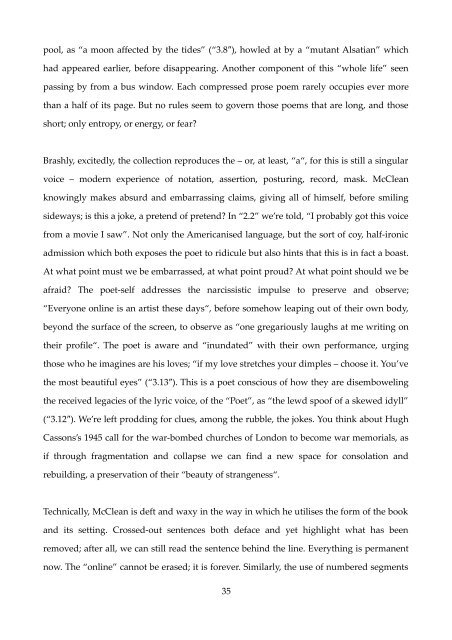Create successful ePaper yourself
Turn your PDF publications into a flip-book with our unique Google optimized e-Paper software.
pool, as “a moon affected by the tides” (“3.8″), howled at by a “mutant Alsatian” which<br />
had appeared earlier, before disappearing. Another component of this “whole life” seen<br />
passing by from a bus window. Each compressed prose poem rarely occupies ever more<br />
than a half of its page. But no rules seem to govern those poems that are long, and those<br />
short; only entropy, or energy, or fear?<br />
Brashly, excitedly, the collection reproduces the – or, at least, “a“, for this is still a singular<br />
voice – modern experience of notation, assertion, posturing, record, mask. McClean<br />
knowingly makes absurd and embarrassing claims, giving all of himself, before smiling<br />
sideways; is this a joke, a pretend of pretend? In “2.2” we’re told, “I probably got this voice<br />
from a movie I saw”. Not only the Americanised language, but the sort of coy, half-ironic<br />
admission which both exposes the poet to ridicule but also hints that this is in fact a boast.<br />
At what point must we be embarrassed, at what point proud? At what point should we be<br />
afraid? The poet-self addresses the narcissistic impulse to preserve and observe;<br />
“Everyone online is an artist these days“, before somehow leaping out of their own body,<br />
beyond the surface of the screen, to observe as “one gregariously laughs at me writing on<br />
their profile“. The poet is aware and “inundated” with their own performance, urging<br />
those who he imagines are his loves; “if my love stretches your dimples – choose it. You’ve<br />
the most beautiful eyes” (“3.13″). This is a poet conscious of how they are disemboweling<br />
the received legacies of the lyric voice, of the “Poet”, as “the lewd spoof of a skewed idyll”<br />
(“3.12″). We’re left prodding for clues, among the rubble, the jokes. You think about Hugh<br />
Cassons’s 1945 call for the war-bombed churches of London to become war memorials, as<br />
if through fragmentation and collapse we can find a new space for consolation and<br />
rebuilding, a preservation of their “beauty of strangeness“.<br />
Technically, McClean is deft and waxy in the way in which he utilises the form of the book<br />
and its setting. Crossed-out sentences both deface and yet highlight what has been<br />
removed; after all, we can still read the sentence behind the line. Everything is permanent<br />
now. The “online” cannot be erased; it is forever. Similarly, the use of numbered segments<br />
35


